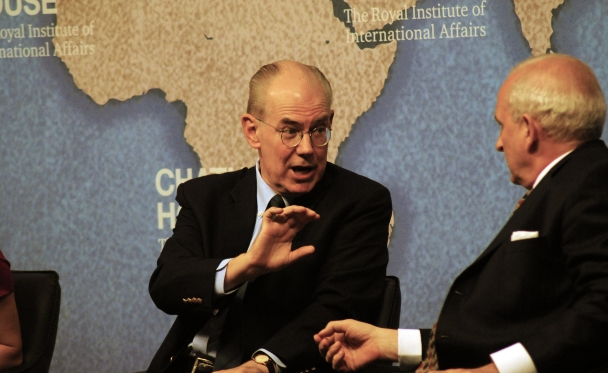
Liberal Dreams & International Realities
Since the end of the Cold War, American foreign policy practitioners on both sides of the aisle have pursued a foreign policy of liberal hegemony: attempting to use U.S. power to spread democracy, markets, and individual rights. Yet this approach has led to costly failures like Iraq and Libya. Why?
In a talk drawn from a forthcoming book on the subject, leading international relations theorist John Mearsheimer argued that U.S. foreign policy has failed to contend with the power of nationalism and the wisdom of realism, leading to a "super ambitious and heavily militarized" global approach.
CPD, the USC John Quincy Adams Society, and the USC School of International Relations were pleased to bring Dr. Mearsheimer to campus for an evening of insightful discussion on global issues in today's challenging climate.
About John Mearsheimer
John J. Mearsheimer is the R. Wendell Harrison Distinguished Service Professor of Political Science and the co-director of the Program on International Security Policy at the University of Chicago, where he has taught since 1982. Professor Mearsheimer has written extensively about security issues and international politics more generally. He has published five books: Conventional Deterrence (1983), which won the Edgar S. Furniss, Jr., Book Award; Liddell Hart and the Weight of History (1988); The Tragedy of Great Power Politics (2001, 2014), which won the Joseph Lepgold Book Prize and has been translated into eight different languages; The Israel Lobby and U.S. Foreign Policy (with Stephen M. Walt, 2007), which made the New York Times best seller list and has been translated into twenty-two different languages; and Why Leaders Lie: The Truth about Lying in International Politics (2011), which has been translated into ten different languages.
He has also written many articles that have appeared in academic journals like International Security, and popular magazines like Foreign Affairs and the London Review of Books. Furthermore he has written a number of op-ed pieces for the New York Times and the Los Angeles Times dealing with topics like Bosnia, nuclear proliferation, American policy towards India, the failure of Arab-Israeli peace efforts, the folly of invading Iraq, and the causes of the Ukrainian crisis. More.
Find out more about the John Quincy Adams Society at USC by following this link.
Refreshments will be served.
On-campus parking can be purchased for $12, and the closest parking structure to the USC Annenberg School for Communication & Journalism is the McCarthy Way structure located on 34th Street and S. Figueroa Blvd.
Visit CPD's Online Library
Explore CPD's vast online database featuring the latest books, articles, speeches and information on international organizations dedicated to public diplomacy.











